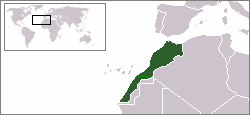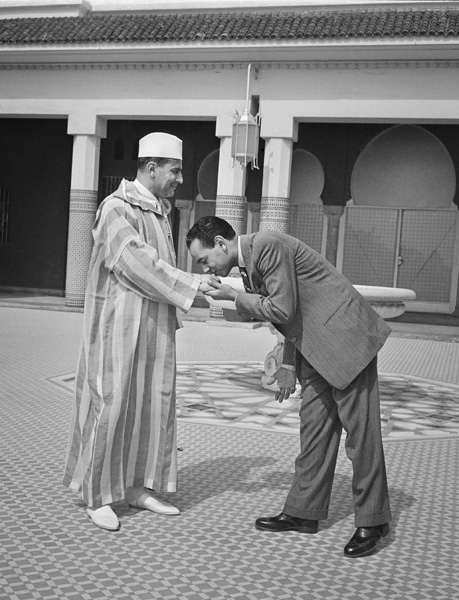|
Morocco's Equity And Reconciliation Commission
The Equity and Reconciliation Commission (, , ; IER) was a Moroccan truth and reconciliation commission active under a two-year mandate from 2004 to 2005 focusing on human rights abuses committed during the Years of Lead mainly under King Hassan II's rule. The commission was established on January 7, 2004 by King Mohammed VI through a Dahir. The commission was established to reconcile victims of human rights abuses, such as torture, forced disappearances and arbitrary arrests, committed by the government and high-ranking officials during the Years of Lead, with the State. The commission investigates events from 1956 to 1999, spanning the reign of the two previous monarchs. The proclaimed objectives of the commission were the protection and the promotion of the human rights in Morocco. The IER is considered by truth commission expert Priscilla B. Hayner to be one of the "five strongest truth commissions". The IER was presided by activist Driss Benzerki, a left-wing activ ... [...More Info...] [...Related Items...] OR: [Wikipedia] [Google] [Baidu] |
Years Of Lead (Morocco)
The Years of Lead () was a period of the rule of King Hassan II of Morocco, from roughly the 1960s through the 1980s, marked by state violence and repression against political dissidents and democracy activists. Timeframe Hassan II was king from 1961 until his death in 1999. His reign was marked by political unrest and a heavy-handed government response to criticism and opposition. Political repression increased dramatically upon Hassan's ascent to the throne of the country in 1961, and this repressive political climate would last for nearly three decades. Due to strong popular mobilization from the Moroccan democracy and human rights activists and pressure from the general Moroccan population, as well as pressure from the wider international community, Morocco experienced a slow but notable improvement in its political climate and human rights situation. The pace of reform accelerated with Hassan II's death and the accession of his son Mohammed VI to the throne in 1999. R ... [...More Info...] [...Related Items...] OR: [Wikipedia] [Google] [Baidu] |
Rome Statute Of The International Criminal Court
The Rome Statute of the International Criminal Court is the treaty that established the International Criminal Court (ICC). It was adopted at a diplomatic conference in Rome, Italy on 17 July 1998Michael P. Scharf (August 1998)''Results of the Rome Conference for an International Criminal Court''. The American Society of International Law. Retrieved on 31 January 2008. and it entered into force on 1 July 2002. As of January 2025, 125 states are party to the statute. Among other things, it establishes court function, jurisdiction and structure. The Rome Statute established four core international crimes: genocide, crimes against humanity, war crimes, and the crime of aggression. Those crimes "shall not be subject to any statute of limitations". Under the Rome Statute, the ICC can only investigate and prosecute the four core international crimes in situations where states are "unable" or "unwilling" to do so themselves. The jurisdiction of the court is complementary to jurisdict ... [...More Info...] [...Related Items...] OR: [Wikipedia] [Google] [Baidu] |
Western Sahara
Western Sahara is a territorial dispute, disputed territory in Maghreb, North-western Africa. It has a surface area of . Approximately 30% of the territory () is controlled by the Sahrawi Arab Democratic Republic (SADR); the remaining 70% is military occupation, occupied and administered by neighboring Morocco. It is the most sparsely populated territory in Africa and the list of countries and dependencies by population density, second most sparsely populated territory in the world, mainly consisting of desert flatlands. The population is estimated at 618,600. Nearly 40% of that population lives in Morocco-controlled Laayoune, the largest city of Western Sahara. Previously occupied by Spain (Spanish Colony) as the Spanish Sahara until 1975, Western Sahara has been on the United Nations list of non-self-governing territories since 1963 after a Moroccan demand. In 1965, the United Nations General Assembly adopted a resolution on Western Sahara, asking Spain to decolonization, de ... [...More Info...] [...Related Items...] OR: [Wikipedia] [Google] [Baidu] |
Mohammed V Of Morocco
Mohammed al-Khamis bin Yusef bin Hassan al-Alawi, better known simply as Mohammed V (10 August 1909 – 26 February 1961), was the last Sultan of Morocco from 1927 to 1953 and from 1955 to 1957, and first King of Morocco from 1957 to 1961. A member of the 'Alawi dynasty, he played an instrumental role in securing the independence of Morocco from the French and Spanish Protectorates. Mohammed was enthroned as sultan upon the death of his father Yusef bin Hassan in 1927. Early in his reign, his approval of the Berber Dahir drew widespread backlash and spurred an upsurge of Moroccan nationalism and opposition to continued French rule. Initially more amenable to colonial authorities, Mohammed grew increasingly supportive of the nationalist movement later on. During World War II he supported the Allies, participated in the 1943 Anfa Conference and took steps to protect Moroccan Jews from Vichy persecution. Mohammed became a central figure of the independence cause after the ... [...More Info...] [...Related Items...] OR: [Wikipedia] [Google] [Baidu] |
Scramble For Africa
The Scramble for Africa was the invasion, conquest, and colonialism, colonisation of most of Africa by seven Western European powers driven by the Second Industrial Revolution during the late 19th century and early 20th century in the era of "New Imperialism": Belgian colonial empire, Belgium, French colonial empire, France, German colonial empire, Germany, British Empire, United Kingdom, Italian Empire, Italy, Portuguese Empire, Portugal and Spanish Empire, Spain. In 1870, 10% of the continent was formally under European control. By 1914, this figure had risen to almost 90%; the only states retaining sovereignty were Liberia, Ethiopian Empire, Ethiopia, Egba United Government, Egba, Sultanate of Aussa, Aussa, Senusiyya, Mbunda Kingdom, Mbunda, the Dervish State, the Darfur Sultanate, and the Ovambo people#History, Ovambo kingdoms, most of which were later conquered. The 1884 Berlin Conference regulated European colonisation and trade in Africa, and is seen as emblematic of t ... [...More Info...] [...Related Items...] OR: [Wikipedia] [Google] [Baidu] |
Protectorate
A protectorate, in the context of international relations, is a State (polity), state that is under protection by another state for defence against aggression and other violations of law. It is a dependent territory that enjoys autonomy over most of its internal affairs, while still recognizing the suzerainty of a more powerful sovereign state without being a possession. In exchange, the protectorate usually accepts specified obligations depending on the terms of their arrangement. Usually protectorates are established de jure by a treaty. Under certain conditions—as with History of Egypt under the British#Veiled Protectorate (1882–1913), Egypt under British rule (1882–1914)—a state can also be labelled as a de facto protectorate or a veiled protectorate. A protectorate is different from a colony as it has local rulers, is not directly possessed, and rarely experiences colonization by the suzerain state. A state that is under the protection of another state while retai ... [...More Info...] [...Related Items...] OR: [Wikipedia] [Google] [Baidu] |
France
France, officially the French Republic, is a country located primarily in Western Europe. Overseas France, Its overseas regions and territories include French Guiana in South America, Saint Pierre and Miquelon in the Atlantic Ocean#North Atlantic, North Atlantic, the French West Indies, and List of islands of France, many islands in Oceania and the Indian Ocean, giving it Exclusive economic zone of France, one of the largest discontiguous exclusive economic zones in the world. Metropolitan France shares borders with Belgium and Luxembourg to the north; Germany to the northeast; Switzerland to the east; Italy and Monaco to the southeast; Andorra and Spain to the south; and a maritime border with the United Kingdom to the northwest. Its metropolitan area extends from the Rhine to the Atlantic Ocean and from the Mediterranean Sea to the English Channel and the North Sea. Its Regions of France, eighteen integral regions—five of which are overseas—span a combined area of and hav ... [...More Info...] [...Related Items...] OR: [Wikipedia] [Google] [Baidu] |
Le Monde
(; ) is a mass media in France, French daily afternoon list of newspapers in France, newspaper. It is the main publication of Le Monde Group and reported an average print circulation, circulation of 480,000 copies per issue in 2022, including 40,000 sold abroad. It has been available online since 1995, and it is often the only French newspaper easily obtainable in non-French-speaking countries. It should not be confused with the monthly publication ', of which has 51% ownership but is editorially independent. is considered one of the French newspapers of record, along with ''Libération'' and . A Reuters Institute for the Study of Journalism, Reuters Institute poll in 2021 found that is the most trusted French newspaper. The paper's journalistic side has a collegial form of organization, in which most journalists are tenured, unionized, and financial stakeholders in the business. While shareholders appoint the company's CEO, the editor is elected by ''Le Monde''s journali ... [...More Info...] [...Related Items...] OR: [Wikipedia] [Google] [Baidu] |
Our Forbidden Places
''Our Forbidden Places'' (original French title:''Nos lieux interdits'') is a 2008 documentary film. Synopsis In 2004, the King of Morocco launched an Equity and Reconciliation Commission The Equity and Reconciliation Commission (, , ; IER) was a Moroccan truth and reconciliation commission active under a two-year mandate from 2004 to 2005 focusing on human rights abuses committed during the Years of Lead mainly under King Hass ... to investigate state violence during the Years of Lead. For three years, the film follows four families in their search for the truth: Activist, young rebel soldier or simple citizen, either they or their relations were imprisoned in different parts of Morocco. Each person tries to "find out", discover a "reason", to be able to mourn. But forty years later, the state secret finally unveils the existence of another, more intimate secret, the family secret. They all feel the need to reconstruct history and recover their parents, taken from them tw ... [...More Info...] [...Related Items...] OR: [Wikipedia] [Google] [Baidu] |
Hassan II
Hassan, Hasan, Hassane, Haasana, Hassaan, Asan, Hassun, Hasun, Hassen, Hasson or Hasani may refer to: People *Hassan (given name), Arabic given name and a list of people with that given name *Hassan (surname), Arabic, Jewish, Irish, and Scottish surname and a list of people with that surname Places * Hassan (crater), an impact crater on Enceladus, a moon of Saturn Africa * Abou El Hassan District, Algeria * Hassan Tower, the minaret of an incomplete mosque in Rabat, Morocco * Hassan I Dam, on the Lakhdar River in Morocco * Hassan I Airport, serving El Aaiún, Western Sahara Americas *Chanhassen, Minnesota, a city in Minnesota, United States * Hassan Township, Minnesota, a city in Minnesota, United States Asia * Hassan, Karnataka, a city and district headquarters in Karnataka, India **Hassan District, a district headquartered in Karnataka, India **Hassan (Lok Sabha constituency) ** Hassan Airport, Karnataka * Hasan, Ilam, a village in Ilam Province, Iran * Hasan, North ... [...More Info...] [...Related Items...] OR: [Wikipedia] [Google] [Baidu] |
Human Rights Watch
Human Rights Watch (HRW) is an international non-governmental organization that conducts research and advocacy on human rights. Headquartered in New York City, the group investigates and reports on issues including War crime, war crimes, crimes against humanity, Child labour, child labor, torture, human trafficking, and Women's rights, women's and LGBTQ rights. It pressures governments, policymakers, companies, and individual abusers to respect human rights, and frequently works on behalf of refugees, children, migrants, and political prisoners. The organization was founded in 1978 as Helsinki Watch, whose purpose was to monitor the Soviet Union's compliance with the 1975 Helsinki Accords. Its separate global divisions merged into Human Rights Watch in 1988. The group publishes annual reports on about 100 countries with the goal of providing an overview of the worldwide state of human rights. In 1997, HRW shared the Nobel Peace Prize as a founding member of the International C ... [...More Info...] [...Related Items...] OR: [Wikipedia] [Google] [Baidu] |




